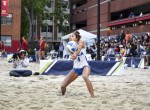Three days after UCLA beach volleyball won the NCAA championship May 5, three Bruins traveled to Brazil to compete in an Olympic qualifier.
Outgoing seniors Nicole and Megan McNamara and Sarah Sponcil will continue their Olympic pursuits in the 2019 FIVB Beach Volleyball World Championships in Hamburg, Germany, starting Friday. The tournament is one of the three opportunities players have to qualify directly for the 2020 Olympics in Tokyo – meaning much of the toughest competition will be in Germany.
“The level of play is a pretty big jump from college to playing on the world tour,” Sponcil said. “Your skills alone aren’t going to take care of it, which I think in college it does and that’s how we won.”
Sponcil entered the professional circuit with partner Kelly Claes, a USC graduate, representing the U.S. The duo practiced throughout the spring season to prepare for the summer circuit, but their debut in the Brazil didn’t go as planned.
The U.S. sent 11 pairs to the FIVB Itapema Open, though only 10 could compete, forcing Sponcil and Claes to face another U.S. team – Brooke Sweat and Kerri Walsh Jennings – for a spot in the first round. Sponcil and Claes’ loss eliminated them before main draw play began – which Sponcil said was a shock after running a 28-5 record in her last season as a Bruin.
“That was a big wake up call for me just because our team obviously won a lot throughout the season in college but the girls are so much better now,” Sponcil said. “You’re not going to win everything – sometimes talent alone isn’t gonna allow you to win games. You need experience, you need to learn how to treat it like a game of chess.”
One of the main differences between the collegiate game and the professional level is the extent to which coaching is allowed. In college, coaches can give input during timeouts and side switches, but professionals are expected to self-coach during matches.
UCLA coach Stein Metzger said Sponcil has room for improvement in terms of self-coaching and strategizing heading into the world championships.
“You really have to be an on-the-court coach, which takes experience, and (Sponcil) recognizes when she plays athletes that are in their 30s that they’re very good at it,” Metzger said. “There’s no quick fix to that, it’s just something that comes with experience and playing at that level. (Sponcil) has admitted that she’s learning at a very rapid pace in terms of strategizing and game planning and having to shoulder that role.”
Unlike Sponcil, the McNamaras have been mostly self-coached in their time as Bruins. The twins have played together since they started the sport and have already had experience representing Canada internationally.
The twins both stand at 5-foot-9, making them the shortest court-one pair in the 2019 NCAA beach volleyball field. While Stein said they are prepared in terms of strategizing, they will need to improve their blocking to have success at the professional level.
“(The McNamaras) are relentless on the court in terms of defense and they really are going to have to rely on that,” Metzger said. “(But) everybody on the pro tour can attack well, and people pass better and set better. … So, in order for (the twins) to change what their opponents do, they won’t just be able to rely on good defense – they’re going to need to change what their opponent does while at the net, which means getting better as blockers.”
Sponcil and Claes enter the World Championships as the No. 14 seed and will face Evgenia Ukolova and Ekaterina Birlova of Russia in the first round. The McNamaras are seeded No. 34, pitting them against Italy’s Marta Menegatti and Viktoria Orsi Toth.

Think about that rapid transition from college athlete to playing on the biggest stage a sport can offer.